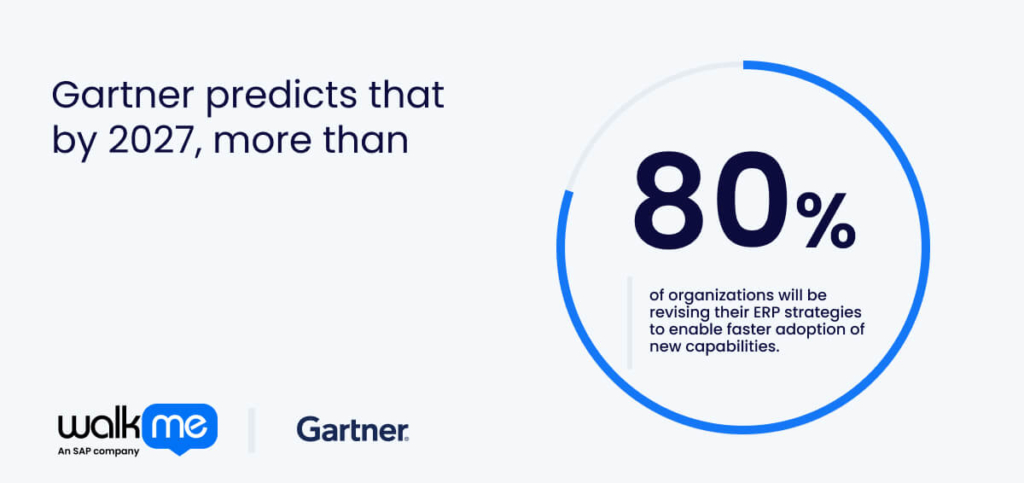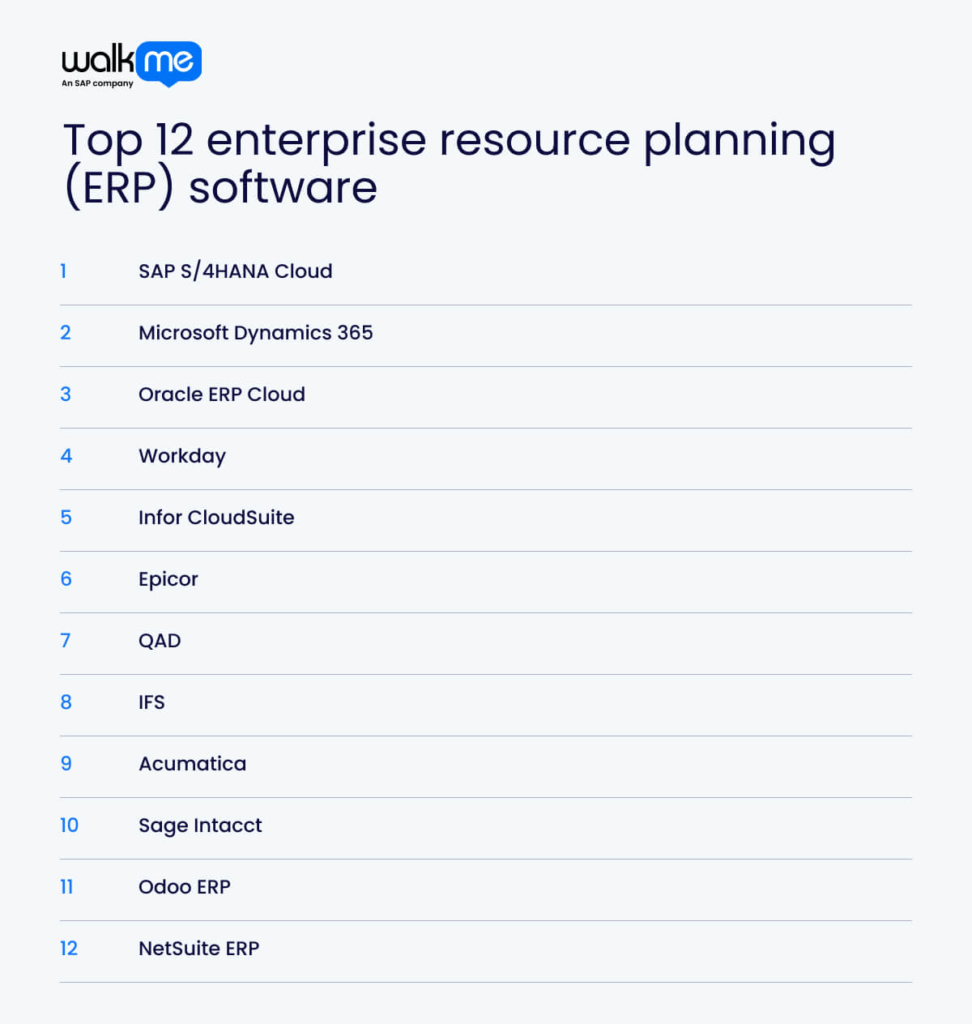Enterprise resource planning (ERP) software isn’t new; it has powered businesses for decades by integrating core operations like finance, supply chain, and HR. Today, enterprises rely on ERP systems to boost digital efficiency and improve decision-making across departments.
Gartner predicts that by 2027, more than 80% of organizations will be revising their ERP strategies to enable faster adoption of new capabilities. This shows how essential ERP has become in managing complex business processes that often require automation and integration.

As companies grow, ERP systems provide the structure and insights needed to stay competitive and agile. This is particularly vital in an era where decisions must be made in real time, and where the true cost of inefficiency is measured in lost opportunities.
With that in mind, this article explores the twelve best ERP software broken down into three categories, including enterprise-grade, industry-specific, and cloud-native. All ratings are based on G2 reviews.

Enterprise-grade ERP platforms
Our first housing category is enterprise-grade ERP platforms. These systems are designed to handle the complex, large-scale needs of big organizations. They offer robust features, high scalability, and strong security to support critical business operations across multiple departments and locations.
SAP S/4HANA Cloud
- Review Rating: 4.5/5 (810 Reviews)
- Best For: Enterprises needing real-time, high-volume data processing across global operations.
SAP S/4HANA Cloud is a powerhouse ERP platform built for enterprises demanding speed, scale, and precision. It’s unique in-memory technology processes massive data instantly, enabling real-time financial close, supply chain visibility, and operational agility.
SAP S/4HANA runs on the HANA in-memory database and offers both S/4HANA Cloud (cloud-native platform editions) and on-premises deployments.
Enterprises rely on S/4HANA Cloud to unify complex functions into a single source of truth. This reduces IT complexity and empowers leaders with actionable insights to drive growth. SAP’s robust security and compliance standards make it a trusted choice for mission-critical business transformation.
Key Features
- In-memory architecture that speeds up complex data transactions
- End-to-end business visibility with integrated analytics across functions
- Quarterly updates to stay aligned with evolving industry standards
Microsoft Dynamics 365
- Review Rating: 4.0/5 (858 Reviews)
- Best For: Organizations looking to unify customer and business operations in a Microsoft-native environment.
Microsoft Dynamics 365 combines CRM and ERP capabilities into one flexible platform, designed to support diverse enterprise needs. It offers intelligent automation, seamless integration with Microsoft tools, and customizable digital workflows.
Its cloud-based architecture enables real-time collaboration across teams and locations. With advanced analytics and AI-driven insights, Dynamics 365 empowers organizations to optimize customer engagement, streamline operations, and respond quickly to market changes while maintaining security and compliance standards.
Key Features
- Built-in AI and automation for smarter sales, service, and finance tasks
- Seamless integration with Microsoft 365 and Teams for smoother collaboration
- Flexible workflows that adapt to changing business models and roles
Oracle ERP Cloud
- Review Rating: 3.8/5 (143 Reviews)
- Best For: Large enterprises requiring deep financial control with predictive planning capabilities.
Oracle ERP Cloud delivers a comprehensive suite of applications tailored for complex enterprise environments. It supports financials, procurement, project management, and risk compliance through an intuitive, scalable interface.
Machine learning (ML) and embedded analytics help organizations forecast accurately and adapt strategies quickly. Seamless updates ensure continuous innovation without disruption. Known for reliability and depth, Oracle ERP Cloud enables large businesses to modernize operations, reduce manual processes, and drive enterprise-wide agility across global teams and industries.
Key Features
- Machine learning forecasts for accurate, real-time decision-making
- Comprehensive financial suite covering procurement, risk, and compliance
- Automatic quarterly updates to maintain security and innovation pace
Workday
- Review Rating: 4.1/5 (174 Reviews)
- Best For: Enterprises focused on integrating finance, HR, and workforce planning in a single platform.
Workday is a unified cloud ERP system built for finance, HR, and planning at enterprise scale. It offers a flexible data core, real-time reporting, and intuitive user experiences across devices. With continuous updates and strong configuration tools, it adapts quickly to organizational changes.
Workday’s strength lies in its ability to connect people, processes, and insights, helping large businesses improve workforce planning, financial visibility, and operational control, all within a secure, scalable platform.
Key Features
- Real-time workforce and finance insights through a unified data model
- Flexible planning tools for scenario modeling and headcount forecasting
- Continuous deployment that delivers new features without disruptions
Industry-Specific ERP Systems
Our next housing category is industry-specific ERP Systems. These platforms are tailored to the unique workflows, regulations, and demands of particular sectors, whether it’s manufacturing, healthcare, retail, or construction.
Unlike general ERP systems, they come pre-configured with features and templates that match industry standards.
Infor CloudSuite
- Review Rating: 3.8/5 (15 Reviews)
- Best For: Industry leaders needing pre-built ERP functionality tailored to manufacturing, healthcare, or distribution.
Infor CloudSuite is purpose-built for specific industries like manufacturing, healthcare, and distribution. Each version is preconfigured with industry workflows, compliance rules, and analytics tailored to real-world operations.
Delivered entirely in the cloud, CloudSuite offers flexibility, scalability, and regular updates without disruption. Its clean interface and role-based dashboards help teams stay productive, while built-in AI tools support smarter decisions.
Key Features
- Role-based dashboards for faster decision-making at every level
- Preconfigured compliance tools designed around industry regulations
- AI-powered analytics built to detect inefficiencies and uncover trends
Epicor
- Review Rating: 4.0/5 (1,077 Reviews)
- Best For: Manufacturers and distributors seeking operational control with strong shop-floor integration.
Epicor is designed for manufacturers, distributors, and service-based industries that need ERP software tailored to their unique operational needs. It offers built-in features for supply chain management, production planning, inventory control, and job costing, all specific to industry demands.
Epicor’s modular structure lets businesses scale at their own pace, while its cloud deployment ensures access from anywhere. With real-time data, automation tools, and a strong focus on usability, Epicor helps specialized organizations improve efficiency, reduce waste, and make faster, more informed decisions in day-to-day operations.
Key Features
- Job costing and production tracking tools built for plant-floor precision
- Modular ERP design that grows with business needs and new markets
- Cloud and hybrid deployment options to suit IT and connectivity constraints
QAD
- Review Rating: 3.5/5 (116 Reviews)
- Best For: Global manufacturers operating in fast-changing, highly regulated markets.
QAD focuses on manufacturers operating in highly regulated, demand-driven industries. It excels in managing global operations, from shop floor to customer delivery, with tools built around adaptability and compliance.
What sets QAD apart is its ability to align ERP functions with changing market conditions through its Adaptive ERP model. Businesses can quickly reconfigure workflows, scale across regions, and maintain quality standards without heavy IT lift.
Key Features
- Adaptive architecture that responds quickly to global supply chain shifts
- Built-in support for multi-site, multi-currency, and multi-language setups
- Compliance-focused design with traceability for audits and reporting
IFS
- Review Rating: 4.0/5 (266 Reviews)
- Best For: Asset-heavy enterprises managing projects, equipment, and service in one platform.
IFS is engineered for asset-intensive industries like aerospace, energy, and construction, where projects, maintenance, and field service drive the business. Unlike traditional ERP systems, IFS combines enterprise resource planning with asset performance management and service capabilities in one integrated platform.
It’s built to handle complex, project-based workflows with real-time visibility into costs, resources, and timelines. IFS also supports mobile workforces with strong field service tools and offline access.
Key Features
- Real-time project visibility to monitor milestones, costs, and performance
- Mobile-first field service tools that keep technicians connected and efficient
- Integrated asset management for tracking usage, maintenance, and ROI
Cloud-Native AI ERP Platforms
Our final category is cloud-native AI ERP Platforms, built from the ground up for the cloud and designed to use AI from the start. They enable faster innovation, smarter automation, and integration with modern digital ecosystems.
Acumatica
- Review Rating: 4.5/5 (1,560 Reviews)
- Best For: Midsize enterprises needing scalable AI-powered cloud ERP with real-time collaboration.
Acumatica is a modern ERP platform designed natively for the cloud, offering flexible deployment and real-time data access. It uses AI to automate workflows, extract insights from unstructured data, and support decision-making across finance, sales, and service functions.
Designed with open APIs and an adaptable data model, Acumatica integrates easily with external systems. Its machine learning features support document recognition, cash flow forecasting, and exception handling—reducing time spent on repetitive tasks.
Key Features
- Native cloud architecture with low-code customization
- AI tools for predictive planning and document automation
- Real-time data sync across finance, projects, and inventory
Sage Intacct
- Review Rating: 4.3/5 (3,810 Reviews)
- Best For: Finance-led teams looking for cloud-native ERP built with AI-driven financial intelligence.
Sage Intacct is one of the more popular cloud-native financial management systems built for organizations that need precision, speed, and AI-powered insight. It’s popular with finance teams looking to automate approvals, accelerate reporting, and improve spend visibility.
Embedded AI simplifies complex accounting tasks, flags anomalies, and learns from transaction patterns to reduce risk. Deep dashboards, granular controls, and real-time reporting make it ideal for multi-entity organizations.
Key Features
- AI-assisted general ledger and anomaly detection
- Continuous audit trails and real-time reporting
- Deep integration with Salesforce and budgeting tools
Odoo ERP
- Review Rating: 4.3/5 (308 Reviews)
- Best For: Agile teams needing a modular cloud ERP with AI-assisted workflows and flexibility.
Odoo is a fully integrated, open-source ERP platform built in the cloud, with a modular approach that lets enterprises deploy only what they need. AI powers features across finance, CRM, inventory, and HR, helping teams automate approvals, detect trends, and streamline workflows.
Natural language search, smart document handling, and auto-tagging are embedded throughout the system. Its flexibility appeals to businesses looking for tailored, AI-augmented operations without vendor lock-in. As needs evolve, Odoo’s ecosystem grows with them, making it a strong option for fast-moving enterprises.
Key Features
- AI-enhanced automation across CRM, billing, and inventory
- Modular apps deployable in the cloud or hybrid environments
- Customizable dashboards with machine learning insights
NetSuite ERP
- Review Rating: 4.1/5 (3,983 Reviews)
- Best For: Global companies needing an all-in-one ERP with native cloud deployment and embedded AI.
NetSuite was the first ERP system built entirely in the cloud, and it continues to lead with advanced AI capabilities. Global enterprises use it to streamline financials, automate operations, and manage subsidiaries. Its AI tools enhance forecasting, accelerate month-end close, and provide predictive analytics that support more intelligent, faster decisions.
Built for scale, NetSuite adapts as organizations grow, whether across regions or business units. Integrations, consistent data flow, and real-time dashboards make it a strong choice for leaders who need clarity across complex operations.
Key Features
- AI-powered forecasting and financial modeling
- True multi-tenant cloud foundation with instant scalability
- Built-in analytics across finance, supply chain, and CRM
How to choose the right ERP for your business
Choosing the right ERP software depends on where your business is now and where you want it to go.
Start by narrowing options based on industry fit, company size, technical capabilities, and budget. A solution designed for manufacturers, for instance, won’t serve a retail operation the same way.
Beyond features, think long-term. Does the platform scale easily as you grow? Can it integrate with the systems you already rely on, such as CRMs, data lakes, or third-party AI tools?
Most importantly, evaluate the software and assess the partnership. The right ERP provider will offer more than dashboards and will give you room to adapt, automate, and grow without friction.
This table links your business needs to the ERP platform that best fits your size, industry, resources, and goals.
| Tool | Best for | Key features |
| SAP S/4HANA Cloud (4.5/5) | Enterprises needing real-time, high-volume processing across global ops | In-memory architecture, end-to-end business visibility, quarterly updates |
| Microsoft Dynamics 365 (4.0/5) | Orgs unifying customer/business ops in Microsoft-native environment | AI/automation for sales/finance, Microsoft 365 integration, flexible workflows |
| Oracle ERP Cloud (3.8/5) | Large enterprises needing deep financial control & predictive planning | ML forecasts, full financial suite, automatic quarterly updates |
| Workday (4.1/5) | Enterprises integrating finance, HR, and workforce planning | Real-time workforce/finance insights, flexible planning tools, continuous deployment |
| Infor CloudSuite (3.8/5) | Industry leaders in manufacturing, healthcare, or distribution | Role-based dashboards, preconfigured compliance, AI-powered analytics |
| Epicor (4.0/5) | Manufacturers/distributors needing shop-floor integration | Job costing & production tracking, modular ERP, cloud/hybrid options |
| QAD (3.5/5) | Global manufacturers in regulated, fast-changing markets | Adaptive architecture, multi-site/multi-currency, compliance-focused design |
| IFS (4.0/5) | Asset-heavy enterprises managing projects/equipment/service | Project visibility, mobile field service, integrated asset management |
| Acumatica (4.5/5) | Midsize enterprises needing AI-powered cloud ERP | Native cloud architecture, AI planning & automation, real-time data sync |
| Sage Intacct (4.3/5) | Finance-led teams wanting AI-driven financial intelligence | AI general ledger, audit trails, Salesforce integration |
| Odoo ERP (4.3/5) | Agile teams needing modular AI-assisted ERP | AI automation across CRM/inventory, modular apps, customizable dashboards |
| NetSuite ERP (4.1/5) | Global companies needing all-in-one native cloud ERP | AI forecasting, multi-tenant cloud, built-in analytics |
What makes the best ERP system?
Choosing the right ERP is a nuanced process with many moving parts. Your main goal is to find the best fit for how your business runs. That’s why we broke this guide down by ERP type: to make it easier to align platforms with company size, complexity, and goals.
Across categories, the top-performing systems share a few critical traits. These include intuitive interfaces, real-time access to data, strong integration capabilities, and scalable AI automation.
But what works for a global enterprise won’t suit a growing startup. The key is clarity and knowing what you need today and what you’ll need tomorrow. Match those needs with the right ERP class, then start testing.
Use free trials, request demos, or speak with ERP consultants to get hands-on insight before committing. The best decisions are informed and start with a system that grows with your business, rather than working against it.
FAQs
Enterprise Resource Planning (ERP) software connects core business functions—like finance, HR, and operations—into one unified system. It improves visibility, streamlines processes, and helps leaders make faster, data-driven decisions by centralizing information across teams and departments.
ERP systems typically fall into three categories. Cloud-based AI ERP platforms offer speed, automation, and lower upfront costs. Enterprise-grade ERP supports large, complex operations with advanced scalability and integrations. Industry-specific ERP caters to unique sector needs, offering tailored tools and workflows.
Start by clarifying your needs, such as industry fit, company size, and budget. Then assess integration compatibility, vendor support, and product scalability. Free trials and case studies help validate choices. The best ERP partner evolves with your business, not just your current state.
AI is reshaping ERP from static systems into intelligent business partners. It powers predictive analytics, self-optimizing workflows, and real-time recommendations. As AI matures, ERP will shift from data management to proactive decision support. It anticipates risks, uncovers growth opportunities, and adapts to market changes before they happen.

